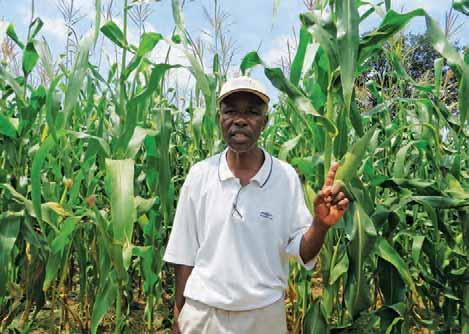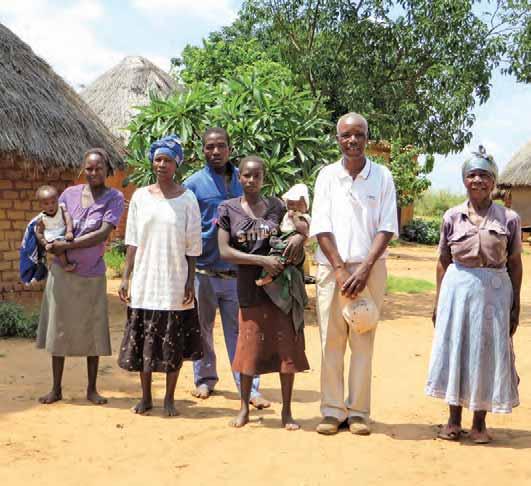
5 minute read
and 13
BUILDING A BETTER LIFE
Team Leader Ben Gilbert (THQ) tells Shanelle Manderson how the work of the International Projects Office is impacting communities
THE UK Territory’s International Projects Office works in 20 countries across Africa, Asia and South America, empowering communities to find lasting solutions to make the department’s vision statement – a world without poverty and injustice – a reality. ‘There are two distinct sides to the work we do,’ Ben explains. ‘First, we partner Salvation Army territories around the world, supporting them and funding some of the projects they’re engaged in. ‘We’re often working in difficult and hard-to-reach areas. But part of the uniqueness of The Salvation Army is that we’re not flying lots of people to these countries; we use local Salvation Army partners to implement the projects so we speak the language and we’re immersed in the culture. We utilise the global infrastructure of our organisation to really impact and reach those who are most marginalised. ‘The other side of our work is focused on our own territory, raising awareness and inspiring people to get engaged, take action and speak up for justice and equality for all.’
The team is also responsible for overseeing the transfer of funds for the Self-Denial Appeal (mission support) as well as emergency response projects. All the projects fall under one of five main themes: food security, focusing on agriculture and improving yields for crops; clean water, which involves providing access to clean water and sanitation facilities; income generation, working with families to possibly provide

micro-loans or set up saving groups to try and stimulate businesses and increase family incomes; anti-trafficking, working with survivors and providing support, but also working with communities to raise awareness of how people are lulled into those situations; gender justice, which can relate to trafficking but is specifically about working in parts of the world where women and girls do not have equal rights.
The selection of these themes originated from communities’ passions and natural synergies. ‘It’s a bit of a mixture,’ says Ben. ‘Anti-trafficking, for example, is big here in the UK and that is a natural fit with our work around the world, but it’s also what people on the ground want to get involved in and deem necessary for the community within specific countries. We match that up with what’s feasible and where our expertise lies.’
The countries the projects operate in often have no social security and limited government healthcare or education, and families may be vulnerable; one missed rainy season or an illness in a family can lead to severe debt and poverty.
‘In these situations our programmes are vital,’ Ben explains. ‘We’re providing different ways for people to become more resilient to cope with the pressures around them.’
Honest Gudu is just one individual


who has benefited from a venture in the Chiweshe district of Harare, Zimbabwe. More than 80 per cent of the country’s population is dependent on subsistence farming, but poor harvests often lead to food insecurity and poverty.
In 2014, Honest became one of twenty-nine farmers to participate in a Salvation Army project that worked with Foundations for Farming, a Zimbabwean organisation. They train farmers in conservation agriculture to ensure they can produce many crops despite inconsistent weather: rainfall and drought. The main focus of the method is farming the way God intended, making best use of the land in a respectful way. This involves taking advantage of natural ecological processes to conserve moisture and enhance soil fertility. Since using this method, Honest’s yield has doubled. He has been able to provide food and clothing for his family and send his six children to school.
An important element of the project was for the first participants to teach others in their villages in order to promote community cohesion and widespread impact. Honest has now become the teacher in his village, helping all his neighbours learn how to use the methods.
Planning and design are important in developing such projects to ensure sustainability and, depending on the complexity of a scheme, it can be fairly flexible or involve an in-depth research phase. A key element is considering the long-term outcomes and the impact the project hopes to achieve.
‘If we begin there then it can really inform the way we design a programme; starting off on the right foot makes it much easier to measure what we’re doing,’ says Ben. ‘So the concept note – an idea or a rough plan and budget for what the programme is going to look like – is the first stage. That is refined and goes through a number of approvals before being developed into a full proposal. During that process we’re looking for funds to finance the programme for its entire length.’ In 2018, the total project spend was £1,150,000. While 10 per cent of the funding came from the UK government, 20 per cent came from emergency disaster public appeals and 70 per cent came from fundraising initiatives by the general public, including corps.
There are three main ways corps can continue to support financially, as Ben explains: ‘First, corps can get behind one of the campaigns we run or one of the emergency appeals.
‘The annual helping-hand appeal rotates around the thematic areas. This year the focus is on income generation. The campaign is called Community Shares.
‘Specific campaigns also run when there’s an event or issue. Last year the three-month Bring Light campaign raised more than £10,000 for the Rohingya refugees in Bangladesh, and this year Get Flushed!, based around World Toilet Day, will raise money for communities that have little access to water and clean sanitation.
‘Second, people can buy items used for our projects using Just Gifts, an online catalogue. For example, you can buy a goat, a water tap or some farming tools. We give you a thank-you voucher, and 100 per cent of that money, plus gift aid if that’s included, goes into these programmes. That’s a tangible way for people to support and it gives them more of an idea of the actual costs involved.
‘Third, corps can choose one of the main themes to raise funds. On our website we have lots of resources about session plans, presentations and information.’
Stories of people who have been impacted by the work the team does, different themes, and events and campaigns they’ve engaged in are some of the content included in the biannual magazine, Develop. Beginning as a newsletter roughly fifteen years ago, it was relaunched in magazine format in 2012 and redesigned last year.
‘Although the look of our magazine may have changed, the essence of our work continues,’ affirms Ben. ‘I can truly say, hand on heart, that lives have been changed through the work of projects funded through the UK Territory. It is so rewarding to see.’









